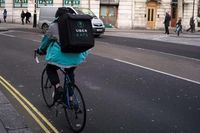British authorities have launched a sweeping crackdown on illegal working in the delivery sector, arresting hundreds of individuals and sending a clear message that the rules governing immigration and employment are being strictly enforced. Between July 20 and 27, 2025, immigration enforcement officers stopped and questioned 1,780 people suspected of working illegally as delivery riders, ultimately arresting 280 of them, according to the UK Interior Ministry. The operation, described by officials as a “week-long crackdown,” is part of a broader government push to address illegal migration and bolster public confidence in the system.
The scale and intensity of the operation were notable. As reported by Eastern Eye and confirmed by the ministry, nearly one in five people checked during the week-long effort were arrested. The government also announced that asylum support was being reviewed for 53 of those detained, signaling a willingness to reconsider the status of individuals who may be abusing the asylum process while working illegally.
This latest enforcement drive comes at a politically sensitive moment. Prime Minister Keir Starmer, who leads a Labour government elected just over a year ago, faces mounting pressure to demonstrate effective action on illegal immigration. The issue has become a political flashpoint, with support for Nigel Farage’s Reform UK party rising in recent polls. Starmer’s government, aware of the public’s growing impatience, has introduced new legal requirements for companies to verify the immigration status of their workers. “This government is making sure rules are respected and enforced,” Border Security Minister Angela Eagle said, underlining the administration’s determination to show results.
The crackdown extended beyond individuals to the businesses that employ them. Civil penalty notices were issued to 51 businesses—including car washes and restaurants—that could now face significant fines for employing illegal workers. Law enforcement also seized 71 vehicles, including 58 e-bikes, and confiscated 8,000 pounds (about $10,751) in cash, as well as 460,000 pounds worth of illicit cigarettes. These seizures highlight the often-complex web of illegal activity that can surround unauthorized work, stretching into areas of tax evasion and smuggling.
To support these efforts, the Interior Ministry has announced a 5 million-pound funding boost for immigration enforcement teams. The aim, officials say, is to ensure that teams have the resources needed to root out illegal working and deter future violations. The crackdown is not a one-off, but part of a sustained campaign to tackle illegal migration and its associated challenges.
Last month, the government struck a new deal with leading food delivery firms—including Deliveroo, Uber Eats, and Just Eat—to share information and prevent illegal working. This partnership is seen as crucial, given the gig economy’s rapid growth and the reliance of many delivery platforms on a flexible, often transient workforce. By collaborating with these companies, the government hopes to close loopholes that have allowed some individuals to slip through the cracks and work without proper documentation.
The results of these efforts are already visible. In the 12 months leading up to July 2025, Britain returned 35,052 people with no right to remain in the country—a 13% increase compared to the previous year. The uptick in removals signals a more assertive approach, though it has also sparked debate among advocacy groups and opposition politicians about the balance between enforcement and compassion.
Immigration policy has long been a contentious issue in the UK, with public opinion divided between those who want tougher controls and those who argue for more humane treatment of migrants and asylum seekers. The recent crackdown has drawn both praise and criticism. Supporters argue that it is necessary to maintain the integrity of the immigration system and protect jobs for legal residents. Critics, however, warn that aggressive enforcement can lead to mistakes and the targeting of vulnerable individuals who may be fleeing hardship or persecution.
International cooperation has also come into play. In early August 2025, France agreed to accept some undocumented migrants who arrive in Britain by small boats, while Britain reciprocated by accepting an equal number of legitimate asylum seekers with family ties in France. This arrangement, reported by Reuters, is designed to share responsibility for migration flows and reduce tensions over cross-Channel arrivals, a perennial source of friction between the two countries.
The broader context is one of growing scrutiny of both employers and workers. The government’s new legal requirements mean that businesses must take greater care in verifying the immigration status of their employees, or risk hefty penalties. For many companies—especially in sectors like food delivery, hospitality, and cleaning—the changes represent a significant shift in their hiring practices. Some business owners have expressed concern about the administrative burden, while others worry about the potential for labor shortages if large numbers of workers are removed from the workforce.
Meanwhile, the affected individuals—many of whom may have turned to delivery work out of economic necessity—face an uncertain future. For the 53 people whose asylum support is under review, the outcome could mean the loss of vital assistance or even removal from the country. Advocacy groups have called for careful consideration of individual circumstances, warning that blanket enforcement measures can sometimes cause undue hardship.
The partnership with food delivery giants Deliveroo, Uber Eats, and Just Eat is particularly significant. These companies have come under increasing scrutiny in recent years over the status of their workers, with debates raging over whether gig economy couriers should be classified as employees or independent contractors. By agreeing to share information with the government, the firms are taking a more active role in policing their own platforms—a move that could have far-reaching implications for the industry.
As the government steps up its efforts, the political stakes remain high. With Nigel Farage’s Reform UK party gaining traction by promising a tougher stance on immigration, Labour’s handling of the issue could prove decisive in future elections. The opposition Conservative Party has also seized on the moment, accusing the government of hypocrisy and calling for even stronger measures.
For now, the message from Downing Street is clear: illegal working will not be tolerated, and both individuals and businesses found breaking the rules will face the consequences. Whether the crackdown will have a lasting impact—either on migration flows or public opinion—remains to be seen. But with new funding, tougher laws, and high-profile partnerships in place, Britain’s approach to illegal working has entered a new, more assertive phase.
As the dust settles from this latest operation, all eyes will be on the government’s next moves—and on whether these efforts can deliver the results that both policymakers and the public are demanding.






